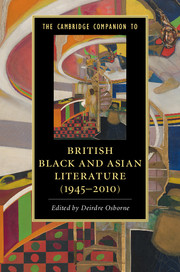Book contents
- Frontmatter
- Dedication
- Contents
- Contributors
- Acknowledgements
- Timeline
- Introduction
- PART I TRACES AND ROUTES
- PART II TRANSLOCATIONS AND TRANSFORMATIONS
- PART III RESTORATIONS AND RENOVATIONS
- PART IV NATIONAL, INTERNATIONAL, TRANSGLOBAL
- 12 ‘Adoption Aesthetics’
- 13 Genre Crossings: Rewriting ‘the Lyric’ in Innovative Black British Poetry
- 14 ‘Other’ Voices and the British Literary Canon
- 15 Critical Outlooks
- Further Reading
- Index
- Series list
13 - Genre Crossings: Rewriting ‘the Lyric’ in Innovative Black British Poetry
from PART IV - NATIONAL, INTERNATIONAL, TRANSGLOBAL
Published online by Cambridge University Press: 05 September 2016
- Frontmatter
- Dedication
- Contents
- Contributors
- Acknowledgements
- Timeline
- Introduction
- PART I TRACES AND ROUTES
- PART II TRANSLOCATIONS AND TRANSFORMATIONS
- PART III RESTORATIONS AND RENOVATIONS
- PART IV NATIONAL, INTERNATIONAL, TRANSGLOBAL
- 12 ‘Adoption Aesthetics’
- 13 Genre Crossings: Rewriting ‘the Lyric’ in Innovative Black British Poetry
- 14 ‘Other’ Voices and the British Literary Canon
- 15 Critical Outlooks
- Further Reading
- Index
- Series list
Summary
In the US, the twenty-first century is powered, in poetic terms, by what its central literary journal recently named ‘the new lyric studies’. It focused fora on the return of interest in lyric as a genre, while millennial poetry anthologies argued that, after long rule by ‘Language poetry’ (America's powerful avant-garde defined, in part, against lyric writing), we had entered an era of the ‘post-avant’, and that poets of all stripes were returning to lyric in new-century work. There are connections between this phenomenon and the burgeoning use of lyric in the work of black British poets. The reasons for having (to a lesser extent) sidelined lyric for a time are different for the latter, of course, and the reasons for re-exploring it are as various as the poets who will be treated here. But they add up to more than the pendulum swing that in part accounts for lyric's return stateside, where primarily aesthetic concerns drive the mix-and-matching of modes dubbed the new American hybridity. This chapter will consider the differing reasons for lyric's return in black British poetics by first taking a broad look at the field, and then by attending to the work of several poets publishing most visibly since the millennium – ranging from innovative writers acclaimed by the mainstream, like Patience Agbabi, to those whose work has been so new in texture, tone and project that they still do not appear on many poetic maps, like D. S. Marriott. I want to argue, as I have in the past, that lyric, in the general sense of being ‘the genre of personal expression’, as Virginia Jackson and Yopie Prins describe it in The Lyric Theory Reader, has always been crucial to raced poetry in the UK because it queries that tacit collation of the personal and universal – a collation that ironically makes lyric the least personal of genres, in a sense (or in theory). After postmodernism's thorough-going investigations of how language overwrites the (‘generalised’) subject, post-postmodern lyric investigations of neglected subjectivities are proving increasingly necessary in black British work.
- Type
- Chapter
- Information
- Publisher: Cambridge University PressPrint publication year: 2016
- 1
- Cited by



